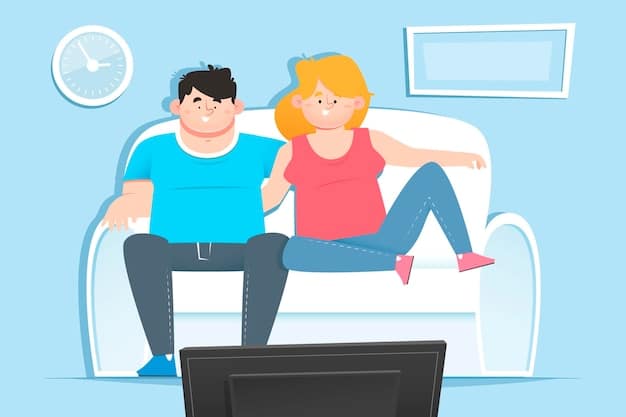Digital Footprint & Relationships: A Privacy and Respect Guide

Is your digital footprint damaging your relationships? Understanding and managing your online presence is crucial for maintaining healthy relationships in today’s digital age, requiring awareness, respect, and proactive privacy measures to safeguard connections and prevent misunderstandings.
In today’s hyper-connected world, our online activities leave traces known as a digital footprint. But is your digital footprint damaging your relationships? Let’s explore how to navigate the digital landscape with awareness and respect.
Understanding Your Digital Footprint
Your digital footprint is the trail of data you leave behind while using the internet. It includes everything from your social media posts to your online shopping history. Recognizing the extent of your digital footprint is the first step toward managing its impact on your relationships.
This footprint isn’t just about what you actively share. It also includes data collected by websites and apps, often without your explicit consent. Understanding these nuances helps you take control of your online presence.
What Constitutes Your Digital Footprint?
Your digital footprint is broader than you might think. It encompasses various online activities, both active and passive. Being aware of these components is key to managing and protecting your online presence.
- Social Media Activity: Posts, comments, likes, and shares on platforms like Facebook, Instagram, and Twitter.
- Online Purchases: Records of your transactions, including what you buy and where you shop.
- Search History: The websites you visit and the terms you search for on engines like Google and Bing.
- Email Communications: The content of your emails and the metadata associated with them.
Each of these actions contributes to a comprehensive profile of you online, which can influence how others perceive you and impact your relationships.
By being mindful of your digital footprint, you can maintain a positive online presence and prevent potential misunderstandings or negative perceptions from affecting your personal connections.
The Impact on Personal Relationships
Your digital footprint can significantly influence your personal relationships. Misunderstandings can arise from misinterpreted posts, privacy breaches, or simply spending too much time online instead of engaging with loved ones.
Managing your online behavior becomes essential for nurturing healthy relationships. It’s about striking a balance between your digital life and your real-world interactions.

Digital Distraction and Neglect
One of the most common ways your digital footprint can harm relationships is through digital distraction. When you’re constantly glued to your phone, you’re likely neglecting the people around you.
This behavior can create a sense of emotional distance and lead to feelings of resentment. It’s important to be present and engaged in your interactions, both online and offline.
- Missed Opportunities: Being distracted by your phone can cause you to miss important moments with loved ones.
- Decreased Quality Time: The quality of your time together diminishes when one or both partners are constantly checking their devices.
- Feelings of Isolation: Excessive screen time can make your partner feel ignored and isolated.
Setting boundaries around technology usage is crucial for fostering deeper connections and maintaining healthy relationships. Prioritize face-to-face interactions and be mindful of how your digital habits affect those around you.
Ultimately, being present and attentive to your loved ones strengthens your bond and ensures that your digital life doesn’t overshadow your personal connections.
Privacy Settings and Boundaries
Adjusting your privacy settings and setting clear boundaries are crucial for protecting your relationships from the potential negative impacts of your digital footprint. This involves controlling who sees your content and how your data is used.
Regularly reviewing and updating your privacy settings on social media platforms can help you manage the visibility of your posts and information. Establishing boundaries for online activity is also essential for maintaining respect and trust within your relationships.
How to Adjust Privacy Settings
Adjusting privacy settings on various platforms allows you to control who can see your posts, photos, and other information. Taking the time to customize these settings can significantly reduce the risk of misunderstandings or privacy breaches that could harm your relationships.
Most platforms offer detailed privacy settings that allow you to specify who can view your content. Explore these options and tailor them to your preferences.
- Facebook: Adjust who can see your posts, friend requests, and profile information.
- Instagram: Control who can follow you and view your stories and posts.
- Twitter: Set your account to private to control who can see your tweets.
- LinkedIn: Manage your profile visibility and connection requests to maintain professional boundaries.
Each of these platforms provides tools to help you manage your digital footprint and protect your privacy. Regular review and updates are essential to ensure your settings align with your evolving needs and preferences.
By taking these steps, you can minimize the risk of unintended exposure and safeguard your relationships from potential harm.
Respectful Online Communication
Respectful online communication is key to maintaining healthy relationships in the digital age. It involves being mindful of your words and actions and avoiding behavior that could be offensive or hurtful.
Think before you post, and consider how your words might be interpreted by others. Avoid engaging in arguments or spreading rumors online. Cultivating a positive and respectful online presence can help you build and maintain strong relationships.

Avoiding Misunderstandings
Online communication can often lead to misunderstandings due to the lack of nonverbal cues such as tone of voice and body language. Being aware of this risk and taking steps to mitigate it can help prevent conflicts and maintain positive relationships.
Clarity and consideration are essential when communicating online. Here are a few tips to avoid misunderstandings:
- Be Clear and Concise: Use straightforward language and avoid ambiguity.
- Use Emojis and Emoticons: These can help convey tone and emotion in your messages.
- Proofread Your Messages: Check for typos and grammatical errors that could change the meaning of your words.
By being mindful of these factors, you can reduce the likelihood of misunderstandings and foster more positive online interactions.
Online communication requires careful consideration and a commitment to clarity, empathy, and respect. By adopting these practices, you can minimize misunderstandings and strengthen your relationships in the digital world.
Monitoring Your Online Presence
Regularly monitoring your online presence is essential for managing your digital footprint effectively. This involves searching for your name online and reviewing your social media profiles to see what information is publicly available.
Setting up Google Alerts can help you stay informed about mentions of your name or other relevant keywords online. By actively monitoring your digital footprint, you can address any potential issues and protect your reputation.
Tools for Monitoring Your Digital Footprint
Several tools and techniques can help you monitor your digital footprint. These resources allow you to track your online mentions, manage your reputation, and identify potential privacy risks.
Take advantage of these tools to stay informed about your online presence and protect your personal information.
- Google Alerts: Set up alerts for your name, email address, and other personal information to receive notifications when they are mentioned online.
- Social Media Audits: Regularly review your social media profiles to identify and remove any content that could be damaging or misleading.
- Reputation Management Services: Consider using professional services to help you monitor and manage your online reputation.
These tools can provide valuable insights into your digital footprint and help you take proactive steps to protect your relationships.
Staying vigilant about your online presence allows you to address potential issues promptly and maintain a positive image, safeguarding your personal and professional connections.
Balancing Online and Offline Life
Balancing your online and offline life is crucial for maintaining healthy relationships and overall well-being. This involves setting boundaries around technology use and prioritizing face-to-face interactions.
Designate specific times for checking emails and social media, and avoid using devices during meals or other quality time with loved ones. Engaging in hobbies and activities that don’t involve screens can also help you disconnect and recharge.
Strategies for Balancing Digital and Real-World Interactions
Achieving a healthy balance between your online and offline life requires conscious effort and the implementation of practical strategies. These steps can help you prioritize real-world connections and minimize the negative impacts of excessive digital engagement.
By adopting these strategies, you can create a more balanced and fulfilling life, nurturing your relationships and enhancing your overall well-being.
- Schedule Device-Free Time: Set aside specific periods each day when you disconnect from all devices.
- Prioritize Face-to-Face Interactions: Make time for in-person conversations and activities with loved ones.
- Engage in Offline Hobbies: Pursue activities that don’t involve screens, such as reading, exercising, or spending time in nature.
Finding a balance between your digital and real-world interactions is a continuous process that requires self-awareness and commitment. By implementing these strategies, you can safeguard your relationships and enhance your overall quality of life.
Balancing your digital and real-world interactions is a continuous process that requires self-awareness and commitment. By implementing these strategies, you can safeguard your relationships and enhance your overall quality of life.
| Key Point | Brief Description |
|---|---|
| 📱 Manage Privacy | Adjust privacy settings to control who sees your content. |
| 💬 Respect Online | Communicate respectfully to avoid misunderstandings. |
| ⏰ Balance Time | Balance online and offline activities for healthy relationships. |
| 🔍 Monitor Footprint | Regularly check your online presence and mentions. |
Frequently Asked Questions
▼
Search your name on Google and other search engines. Review your social media profiles and check privacy settings. Use Google Alerts to track mentions of your name online.
▼
Limit who can see your posts, photos, and profile information on social media. Adjust settings on apps to control data sharing and location tracking.
▼
Think before you post. Be clear and concise in your messages. Avoid engaging in arguments or spreading rumors. Use emojis to convey tone.
▼
Schedule device-free time each day. Prioritize face-to-face interactions. Engage in hobbies and activities that don’t involve screens. Set technology boundaries.
▼
Address the issue calmly and professionally. Contact the platform to request removal of inappropriate content. Seek legal advice if necessary for defamation.
Conclusion
Managing your digital footprint is an ongoing process that requires awareness, respect, and proactive measures. By understanding the impact of your online presence, adjusting your privacy settings, communicating respectfully, monitoring your digital footprint, and balancing your online and offline life, you can protect your relationships and create a positive digital legacy.





